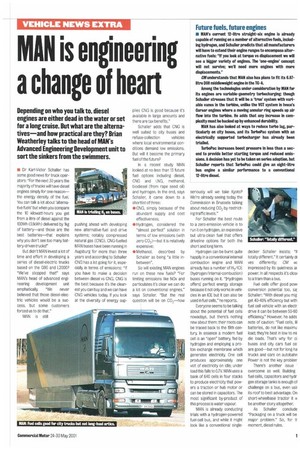MAN is engineering a change of heart
Page 13

If you've noticed an error in this article please click here to report it so we can fix it.
Depending on who you talk to, diesel engines are either dead in the water or set for a long cruise. But what are the alternatives—and how practical are they? Brian Weatherley talks to the head of MAN's Advanced Engineering Development unit to sort the sinkers from the swimmers.
• Dr Karl-Victor Schaller has some good news for truck operators: "For the next 30 years the majority of trucks will have diesel engines simply for one reason— the energy density of the fuel. You can talk a lot about 'alternative fuels' but when you compare the 10 kilowatt-hours you get from a litre of diesel against the 100Wh (0.1kWh) delivered by 1kg of battery—and those are the best batteries—that explains why you don't see too many battery-driven trucks!"
But didn't MAN invest a lot of time and effort in developing a series of diesel-electric trucks based on the 090 and L2000? "We've stopped that!" says MAN's head of advanced engineering development unit emphatically. 'We never believed that those diesel-electric vehicles would be a success, but some customers forced us to do that."
MAN is still pushing ahead with developing new alternative-fuel and drive systems; notably compressed natural gas (CNG). CNG-fuelled MAN buses have been running in Augsburg for more than three years and according to Schaller CNG has a lot going for it, especially in terms of emissions: "If you have to make a decision between diesel vs CNG, CNG is the best because it's the cleanest you can buy and we can have CNG vehicles today. If you look at the diversity of energy sup plies CNG is good because it's available in large amounts and there are tax benefits."
Schaller adds that CNG is well suited to city buses and
refuse-collection vehicles where local environmental conditions demand low emissions, But will it become the primary fuel of the future?
In a recent study MAN looked at no less than 13 future fuel options including diesel, CNG and LNG, methanol, biodiesel (from rape seed oil) and hydrogen. In the end, says Schaller, it came down to a shortlist of three: • CNG, simply because of the abundant supply and cost effectiveness;
• Hydrogen, considered the "almost perfect" solution in terms of low emissions (with zero CO2)—but it is relatively expensive;
• Methanol, described by Schaller as being "a little inbetween",
So will existing MAN engines run on these new fuels? "For limiting emissions like NOx and particulates it's clear we can do a lot on conventional engines," says Schaller. "But the real question will be on CO2—how seriously will we take Kyoto? We're already seeing today the Commission in Brussels talking about reducing CO2 by restricting traffic levels."
For Schaller the best route to a zero-emission vehicle is to run it on hydrogen, an expensive but ultra-clean fuel that offers driveline options for both the short and long term.
Hydrogen can be burnt quite happily in a conventional internal combustion engine and MAN already has a number of H2/ICE (hydrogen/internal-combustion) buses running on it. "[Hydrogen offers] perfect energy storage because it not only works in vehicles in an ICE but it can also be used in fuel cells," he reports.
Everyone seems to be talking about the potential of fuel cells nowadays, but there's nothing new about them: their roots can be traced back to the 19th century. In essence a modern fuel cell is an "open" battery, fed by hydrogen and employing a proton exchange membrane which generates electricity. One cell produces approximately one volt of electricity on idle; under load this falls to 0.N. MAN uses a bank of 640 cells in four stacks to produce electricity that powers a traction or hub motor or can be stored in capacitors,. The most significant by-product of this process is water vapour.
MAN is already conducting trials with a hydrogen-powered fuel-cell bus, and while it might look like a conventional single
decker Schaller insists: "II totally different." It certainly di ves differently; CM wt impressed by its quietness an power. In all respects it's closi to a tram than a bus.
Fuel cells offer good powi conversion potential too, sa: Schaller: "With diesel you mig get 40-45% efficiency but with fuel cell vehicle with an electr drive it can be between 50-60 efficiency." However, he adds note of caution: "Fuel cells, Ill batteries, do not like maximu load; they're best in low to mi die loads. That's why for ci buses and city cars fuel ce are good—but not for long-ha trucks and cars on autobahn Power is not the key problem There's another issue overcome as well. Building fuel cells, capacitors and hydr gen storage tanks is enough ol challenge on a bus, even usii its roof to best advantage. On short-wheelbase tractor it vi be another story altogether.
As Schaller conclude "Packaging on a truck will be major problem." So, for 0 moment, diesel rules.




























































































































